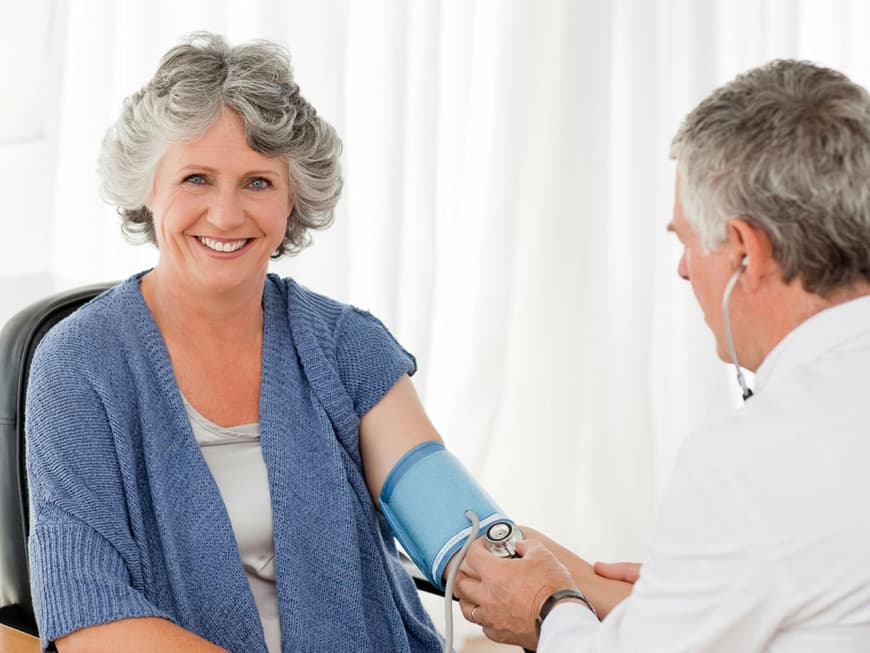
What is high blood pressure and why should it be avoided?
We speak of high blood pressure or arterial hypertension when it is 140/90 mmHg or higher. Ideally, the value should be below 120/80 mmHg. A temporary increase can occur in any of us due to stress or exercise, illness, as a side effect of certain medications or during pregnancy. It is also naturally higher in the morning than in the evening. Only if your values remain permanently elevated is there a pathological change.
This can lead to a variety of secondary diseases with potentially fatal consequences. As there are often no or only mild symptoms, high blood pressure is unfortunately often only recognized when vascular damage has already occurred. High blood pressure increases your risk of:
- Arteriosclerosis (vascular calcification)
- Diabetes mellitus
- stroke
- Coronary heart disease and heart attack
- Kidney damage
Signs of high blood pressure can include headaches, dizziness, shortness of breath, nervousness and frequent tiredness. However, it can also be caused by diseases of other organs. This should definitely be clarified. However, psychological factors, your lifestyle and your diet have a major influence. However, this is also an excellent starting point for lowering your blood pressure again.
Medication that lowers your blood pressure
To relieve your heart and protect yourself from secondary diseases, there are of course medications that can lower your blood pressure. When choosing medication, your doctor will also take into account other illnesses and risk factors, such as a family history of heart disease.
There are four common types of medication: Beta blockers inhibit the effect of the stress hormone adrenaline on the heart - this lowers your pulse rate and blood pressure. ACE inhibitors relax and widen the blood vessels by inhibiting a hormone that increases blood pressure. This also lowers blood pressure. Angiotensin-1 receptor antagonists act on the same system. Calcium antagonists also reduce the tension in the blood vessels.
As the medication is of course not without side effects and only combats symptoms, it is advisable to administer it in severe cases in particular, otherwise a change in lifestyle is often enough. This is because many elements of our modern life in the western world contribute directly to our risk of high blood pressure.
Helpful steps you can take to lower your blood pressure
Firstly, reducing your body weight has a positive effect on blood pressure, as fat accumulation on the stomach in particular promotes the production of blood pressure-raising hormones. Regardless of your weight, exercise is always advisable. Studies have repeatedly confirmed that exercise effectively lowers blood pressure. Light exercise three times a week, for example walking, cycling or swimming, is enough. You don't have to work up a sweat or lift weights, calm movements are sufficient and endurance sports are particularly beneficial. Sport can not only help you lose weight, but also reduce stress. Because stress is another risk factor. If you are under pressure, so are your blood vessels. It is therefore particularly important to eliminate sources of stress in order to lower your blood pressure. Create periods of rest and make sure you get enough sleep, as a lack of sleep also damages your body. In addition, autogenic training or meditation can help to bring relaxation into your life.
Fast food is also the enemy of your heart. Burgers, chips and sausages often contain far higher amounts of salt than the recommended daily intake. A balanced diet with plenty of fruit, vegetables, lean meat and fish, on the other hand, can lower your blood pressure. You can take Mediterranean dishes as an example. To add flavor to dishes, replace salt with fresh herbs. Omega-3 fatty acids, as contained in fish, also reduce the risk of heart disease. You should also skip the well-intentioned Coke Zero, as many sweeteners also increase blood pressure.
Another vice that should be stopped for the sake of your heart is smoking. Alcohol should also be limited to a glass of wine in the evening. Excessive alcohol consumption, on the other hand, increases your pulse rate and blood pressure. Instead, treat yourself to a cup of tea; green tea in particular has been shown to have a positive effect.
Prevention is better than cure
To check your blood pressure regularly, you can buy your own measuring device or have it measured free of charge at the pharmacy. A change in your lifestyle can often be enough. However, if your blood pressure remains unchanged, permanently and significantly elevated, a long-term measurement should be carried out. Your doctor will work with you to choose the right medication based on your previous illnesses and risk factors. Due to the risk of fatal secondary diseases, you should not take high blood pressure lightly, but should take the necessary measures with medical advice.






